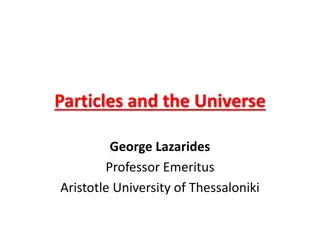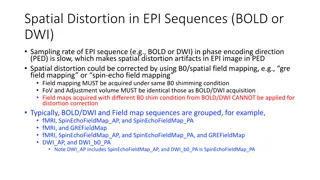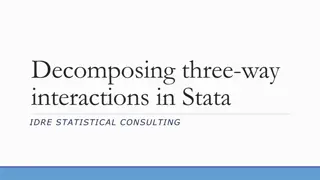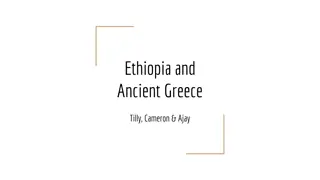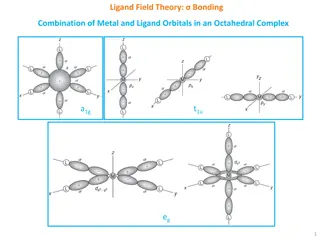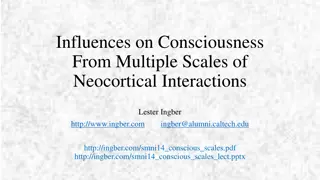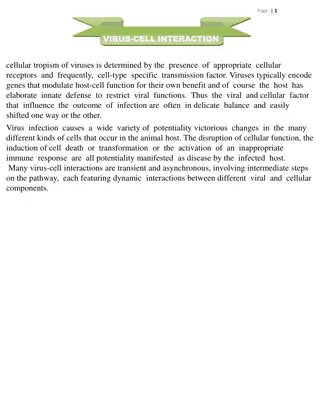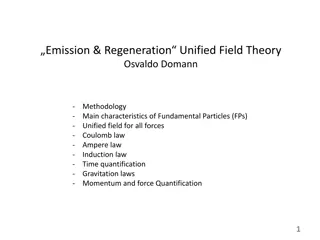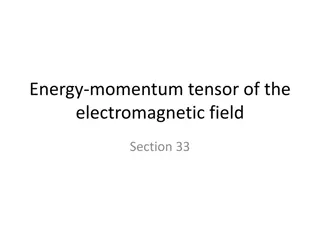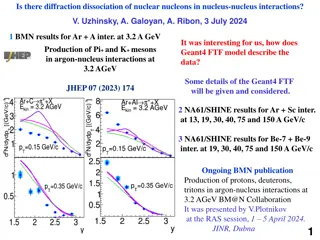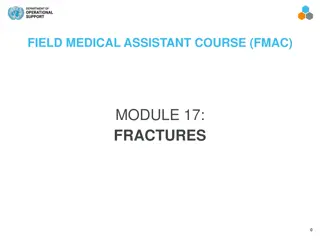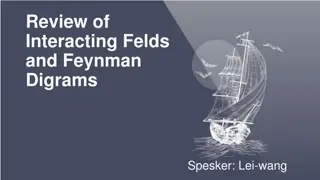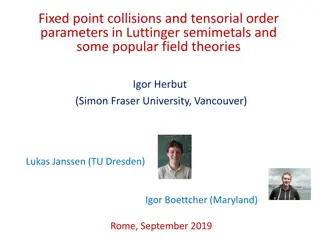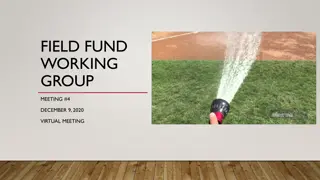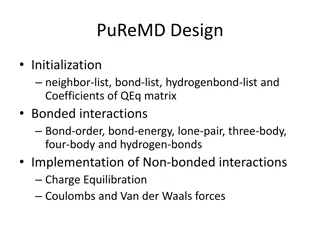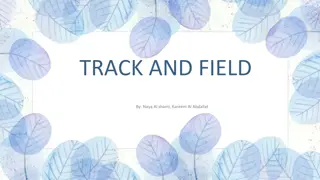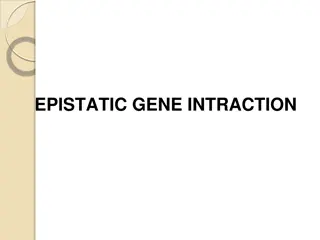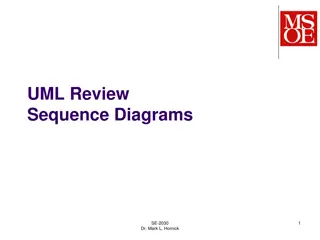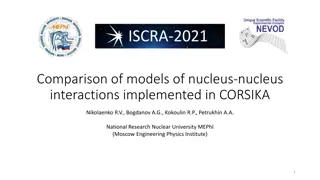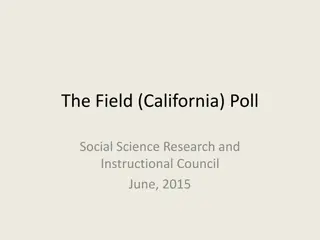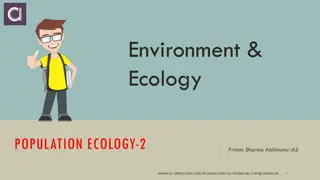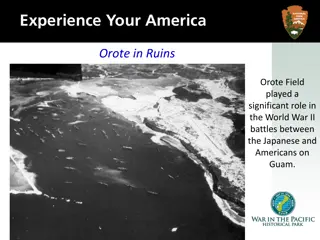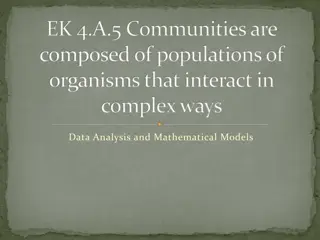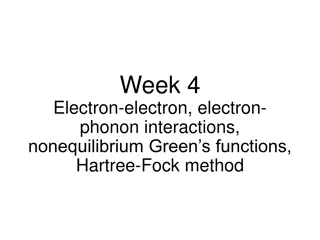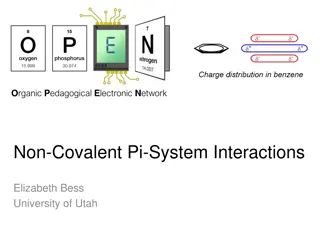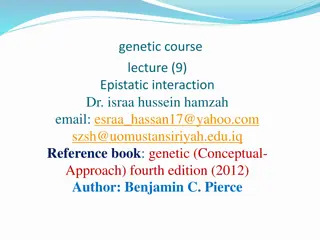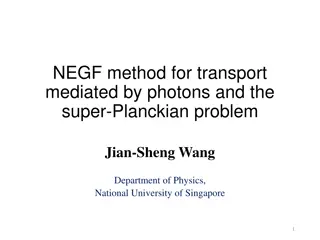Understanding Virus-Cell Interactions: Mechanisms and Consequences
Viruses interact with host cells in various ways, encoding genes that manipulate cell functions for their benefit. These interactions can range from benign to lethal outcomes. Factors influencing these interactions include viral factors, cellular responses, and the presence of virulence factors. Dif
0 views • 37 slides
Exploring Particles and Fundamental Interactions in the Universe
Delve into the intricate world of particles and fundamental interactions in the Universe as explained by Professor Emeritus George Lazarides from Aristotle University of Thessaloniki. Discover the structure of matter, classification of particles based on interactions, constituents of hadrons, conser
1 views • 36 slides
Crystal Field Theory in Transition Metal Complexes
Crystal Field Theory (CFT) explains the colors and magnetic properties of transition metal complexes. It focuses on the energy changes in d-orbitals of metal ions caused by surrounding ligands. This theory, developed in 1929, provides insights into the bonding interactions in complex compounds. The
10 views • 44 slides
Understanding Hyperfine Interactions in Atomic Physics
Hyperfine interactions play a crucial role in atomic physics, leading to small energy shifts and splitting of degenerate levels in atoms and molecules. These interactions involve the electromagnetic multipole interactions between the nucleus and electron clouds, resulting in the splitting of energy
13 views • 154 slides
5 Medical Cannabis Interactions Every Physician Must Understand
As medical cannabis becomes increasingly integrated into healthcare practices, itu2019s imperative for physicians to be well-versed in potential interactions with other medications. While cannabis offers promising therapeutic benefits, its interactions with certain drugs can pose risks to patients.
1 views • 2 slides
Spatial Distortion Correction in EPI Sequences: Field Mapping Examples
Spatial distortion artifacts in EPI sequences (BOLD or DWI) due to slow sampling rates in the phase encoding direction can be corrected using B0/spatial field mapping techniques. This correction requires obtaining field maps under the same B0 shimming conditions and with identical FoV and adjustment
0 views • 4 slides
Understanding Electric Fields: Chapter 1 Overview
Delve into the fundamental concepts of electric fields in Chapter 1 as we explore properties of electric charges, charging objects by induction, Coulomb's Law, the electric field, electric field lines, and the motion of charged particles in a uniform electric field. Discover how electric forces shap
1 views • 10 slides
Understanding Three-Way Interactions in Regression Models
Three-way interactions in regression models add complexity to interpreting the effects of predictors. This article explains how to decompose three-way interactions in Stata, model them effectively, and assess their significance using contrast tests. Practical examples and Stata commands are provided
0 views • 17 slides
Interactions Between Ancient Greece and Ethiopia: A Historical Overview
Ancient Greece and Ethiopia had significant interactions throughout history. The relationship started with trade and the employment of Greek mercenaries by the Egyptian rulers. Greeks were intrigued by rumors about Ethiopians, leading to explorations and interactions. This period ended with Alexande
0 views • 9 slides
Understanding Ligand Field Theory in Octahedral Complexes
Ligand Field Theory explains the bonding interactions between metal and ligand orbitals in octahedral complexes. This theory involves the combination of metal and ligand orbitals to form molecular orbitals, leading to specific electronic configurations. The overlap of metal and ligand group orbitals
1 views • 10 slides
Understanding Crystal Field Theory in Chemistry
Crystal Field Theory (CFT) explains how electron orbital degeneracies, particularly d or f orbitals, are affected by a static electric field generated by neighboring anions. In CFT, the metal ion is considered positive while ligands are negative charges, leading to attractive and repulsive forces af
0 views • 13 slides
Exploring Influences on Consciousness Through Neocortical Interactions
Delve into the intriguing realm of consciousness with Lester Ingber's research on the influences stemming from multiple scales of neocortical interactions. The investigations cover various aspects such as mind over matter, recursive interactions, neuronal scales in the neocortex, and statistical mec
1 views • 41 slides
Understanding Virus-Cell Interactions and Infections
Viral infections exhibit diverse cellular tropism based on receptor interactions, impacting cell function through modulation and potential host defense responses. Infections can lead to various outcomes, from cell death to persistent or latent states, with nuanced effects on cellular behavior. Diffe
0 views • 8 slides
Understanding Electric Field Lines and Charges
Electric field lines provide a visual representation of the electric field around charges. They show the direction of the electric field and help understand the intensity of the field at different points. Field lines never cross each other and the tangent at any point on a line gives the field direc
2 views • 40 slides
Unified Field Theory of Fundamental Particles by Osvaldo Domann
Methodology, characteristics, and interactions of Fundamental Particles (FPs) in the Unified Field Theory proposed by Osvaldo Domann are explored. The theory covers the unified field for all forces, quantum laws, momentum quantification, and more. It introduces the concept of Fundamental Particles m
0 views • 21 slides
Understanding the Energy-Momentum Tensor of the Electromagnetic Field
Exploring the intricacies of the energy-momentum tensor of the electromagnetic field, including its components, symmetries, and implications on field interactions and invariants. Delve into the mathematical derivations and transformations involved in studying this fundamental concept in electromagne
0 views • 19 slides
Understanding Diffraction Processes and Meson Production in Nuclear Interactions
Exploration of diffraction dissociation of nuclear nucleons in nucleus-nucleus interactions using Geant4 FTF model and NA61/SHINE results for various nucleus combinations. Insights into meson production in argon-nucleus interactions at different energies and the impact of models like DCM/AGT, UrQMD,
0 views • 17 slides
Tactical Field Medical Assistant Training - Fractures Assessment and Management
Explore the Tactical Field Medical Assistant Course training modules focusing on fractures assessment and management. Learn to identify fracture warning signs, differentiate between closed and open fractures, and demonstrate proper splint application. Gain knowledge on caring for fractures in tactic
1 views • 19 slides
Understanding Interacting Fields and Feynman Diagrams in Quantum Field Theory
Delve into the fascinating world of quantum field theory with a focus on interacting fields and Feynman diagrams. Explore perturbation theory, correlation functions, Wick's theorem, and Feynman diagram rules to gain insights into preserving causality, calculating two-point correlation functions, and
0 views • 18 slides
Fixed Point Collisions in Luttinger Semimetals and Field Theories
Exploring fixed point collisions and tensorial order parameters in Luttinger semimetals and various field theories, such as chiral symmetry breaking in QED and Interacting O(N) field theory. The research delves into the condensed matter motivation behind quadratic band touching and the Luttinger Ham
0 views • 39 slides
Field Fund Working Group Meeting Insights and Analysis
The Field Fund Working Group Meeting #4 held on December 9, 2020, virtually discussed various topics related to field fund allocations, fee considerations, and capital improvement plans. The meeting covered important aspects such as benchmarking, investment in capital projects, recurring field maint
0 views • 38 slides
PuReMD Design - Initialization, Interactions, and Experimental Results
PuReMD Design involves the initialization of neighbor lists, bond lists, hydrogen bond lists, and coefficients of QEq matrix for bonded interactions. It also implements non-bonded interactions such as charge equilibration, Coulomb's forces, and Van der Waals forces. The process includes the generati
0 views • 23 slides
Dive into the World of Track and Field: History, Benefits, and Events
Track and field, a sport with ancient origins dating back to the 776 B.C. Olympic games in Greece, involves various athletic events like running, jumping, and throwing. This comprehensive guide covers the introduction, benefits, dimensions of the track field, historical insights, and details about t
0 views • 24 slides
Understanding Epistasis: Genetic Interactions and Their Implications
Epistasis is a phenomenon where the phenotypic expression of one gene is influenced by interactions with another gene. This concept, first introduced in 1909, plays a crucial role in genetics, affecting various traits and evolutionary processes. The difference between dominance and epistasis lies in
0 views • 41 slides
Understanding UML Sequence Diagrams
UML Sequence Diagrams illustrate high-level interactions between class instances in software programs. They represent method calls and interactions among objects during program execution. The diagrams show interactions for specific circumstances like startup or button clicks. Each class/object is re
0 views • 8 slides
Comparison of Models of Nucleus-Nucleus Interactions in CORSIKA
Introduction to the study on models of hadronic interactions at high energies implemented in CORSIKA, a simulation tool used to analyze cosmic ray interactions with Earth's atmosphere. The study compares four widely used models, detailing their features and variants in simulation parameters. Results
0 views • 10 slides
Understanding The Field Poll and Accessing Data Through CSU Campuses
The Field Poll, established in 1947 by Mervin Field, is an independent survey of California public opinion. CSU campuses subscribe to social science databases, granting access to Field Poll data. Access is IP authenticated, requiring access from CSU campuses. The UCDATA website allows users to searc
0 views • 43 slides
Population Interactions in Nature: Competitive and Cooperative Interactions
Every population, whether animal or plant, engages in competitive and cooperative interactions to fulfill their needs for food, shelter, and resources. Intraspecific competition is common among individuals of the same species, leading to a struggle for survival. Interspecific interactions also play
0 views • 17 slides
Weak Interactions and Hydrogen Bonding in Molecular Forces
Exploring van der Waals forces, hydrogen bonding, and weak interactions in intermolecular forces and surface interactions. Understanding interactions between backbone peptide groups and orientation dependence of hydrogen bonding through dispersion forces and repulsive potentials.
0 views • 22 slides
Understanding Intermolecular Forces in Chemistry
Interactions between static charge distributions in chemistry are governed by Coulomb's Law, playing a crucial role in understanding intermolecular forces. From ion-ion interactions to charge-dipole and charge-quadrupole interactions, the strength of forces varies based on factors like distance and
0 views • 21 slides
Intern Placement Tracking (IPT) System for Field Instructors at Western Michigan University
Western Michigan University's School of Social Work introduces an Intern Placement Tracking (IPT) system to oversee students in field education. The web-based software facilitates communication among students, field instructors, faculty liaisons, and coordinators, ensuring secure data management. Us
0 views • 19 slides
Intern Placement Tracking System for Western Michigan University School of Social Work
Western Michigan University School of Social Work has implemented a new web-based software called Intern Placement Tracking (IPT) to monitor field education students, facilitating communication between students, field instructors, faculty liaisons, and field coordinators. The system ensures privacy
0 views • 21 slides
Understanding Use Cases and Actors in System Design
Explore the concept of use cases in system design, including user goals versus interactions, system boundaries, actors, and how they all come together in use case diagrams. Learn how use cases capture user-visible functions, achieve discrete goals, and represent the interactions between actors and t
0 views • 20 slides
Orote Field in World War II: Battles and Remnants
Orote Field played a significant role in the World War II battles between the Japanese and Americans on Guam. The Japanese occupied Guam from December 1941 to July 1944, constructing Orote Field using Korean and Guamanian labor. American raids in 1944 destroyed the field, leading to intense anti-air
0 views • 17 slides
BSW Field Internship Basics for Fall 2021
The BSW Field Internship Basics for Fall 2021 provides key dates, requirements, and guidelines for students embarking on their field internships. It covers important information such as key dates, agency requirements, field hours, seminar details, and the role of BSW field faculty at NC State. The c
0 views • 13 slides
Understanding Population Interactions in Communities
Communities are made up of populations of organisms that interact in various ways, shaping the structure of the community. Population interactions include predator-prey relationships, symbiotic interactions like mutualism and commensalism, parasitism, and competitive exclusion. These interactions in
0 views • 25 slides
Quantum Interactions: Electrons, Phonons, and Hubbard Interaction
Exploring the complexities of electron-electron and electron-phonon interactions, nonequilibrium Green's functions, Hartree-Fock method, Coulomb's law, quantum operator forms, Hubbard interaction, and electron-phonon interactions from first principles. The interactions delve into the behavior of cha
0 views • 20 slides
Understanding Non-Covalent Pi-System Interactions in Molecular Structures
Non-covalent interactions play a crucial role in chemical selectivity and molecular recognition. This article discusses the significance of Pi-system interactions, including Pi-Pi and Cation-Pi interactions, in stabilizing molecular structures like DNA helices and G-quadruplexes. Insights into molec
0 views • 6 slides
Genetic Interactions in Chicken Combs: Epistatic and Non-Epistatic Examples
In chicken genetics, epistatic and non-epistatic interactions play a crucial role in determining comb size and shape. Bateson and Punnett's studies on fowls revealed how different gene pairs interact to produce distinctive phenotypes. Epistatic interactions, such as dominant epistasis, influence the
0 views • 16 slides
Advanced Methods in Transport Phenomena and Quantum Field Theory
Explore cutting-edge research in transport processes mediated by photons, tight-binding models for electron behavior, electron-field interactions, NEGF definitions, fluctuation-dissipation theorem, Dyson equations, and Keldysh equations in the context of quantum field theory and super-Planckian near
0 views • 18 slides

